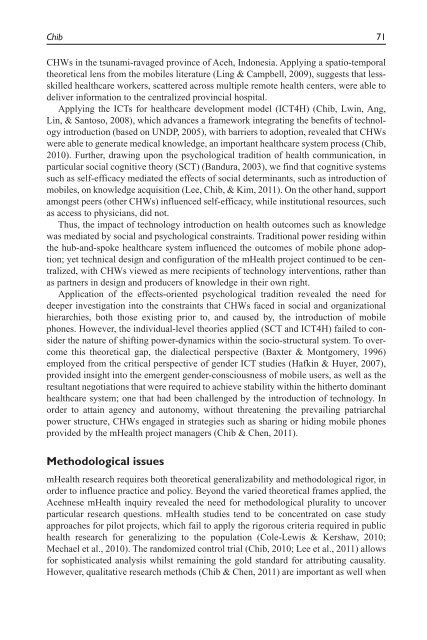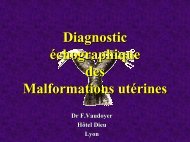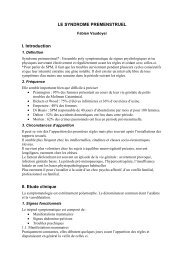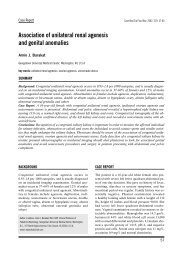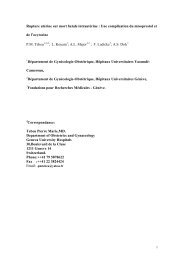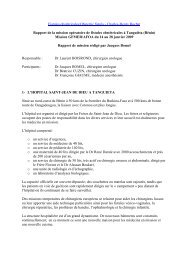The promise and peril of mHealth in developing countries
The promise and peril of mHealth in developing countries
The promise and peril of mHealth in developing countries
Create successful ePaper yourself
Turn your PDF publications into a flip-book with our unique Google optimized e-Paper software.
Chib 71CHWs <strong>in</strong> the tsunami-ravaged prov<strong>in</strong>ce <strong>of</strong> Aceh, Indonesia. Apply<strong>in</strong>g a spatio-temporaltheoretical lens from the mobiles literature (L<strong>in</strong>g & Campbell, 2009), suggests that lessskilledhealthcare workers, scattered across multiple remote health centers, were able todeliver <strong>in</strong>formation to the centralized prov<strong>in</strong>cial hospital.Apply<strong>in</strong>g the ICTs for healthcare development model (ICT4H) (Chib, Lw<strong>in</strong>, Ang,L<strong>in</strong>, & Santoso, 2008), which advances a framework <strong>in</strong>tegrat<strong>in</strong>g the benefits <strong>of</strong> technology<strong>in</strong>troduction (based on UNDP, 2005), with barriers to adoption, revealed that CHWswere able to generate medical knowledge, an important healthcare system process (Chib,2010). Further, draw<strong>in</strong>g upon the psychological tradition <strong>of</strong> health communication, <strong>in</strong>particular social cognitive theory (SCT) (B<strong>and</strong>ura, 2003), we f<strong>in</strong>d that cognitive systemssuch as self-efficacy mediated the effects <strong>of</strong> social determ<strong>in</strong>ants, such as <strong>in</strong>troduction <strong>of</strong>mobiles, on knowledge acquisition (Lee, Chib, & Kim, 2011). On the other h<strong>and</strong>, supportamongst peers (other CHWs) <strong>in</strong>fluenced self-efficacy, while <strong>in</strong>stitutional resources, suchas access to physicians, did not.Thus, the impact <strong>of</strong> technology <strong>in</strong>troduction on health outcomes such as knowledgewas mediated by social <strong>and</strong> psychological constra<strong>in</strong>ts. Traditional power resid<strong>in</strong>g with<strong>in</strong>the hub-<strong>and</strong>-spoke healthcare system <strong>in</strong>fluenced the outcomes <strong>of</strong> mobile phone adoption;yet technical design <strong>and</strong> configuration <strong>of</strong> the <strong>mHealth</strong> project cont<strong>in</strong>ued to be centralized,with CHWs viewed as mere recipients <strong>of</strong> technology <strong>in</strong>terventions, rather thanas partners <strong>in</strong> design <strong>and</strong> producers <strong>of</strong> knowledge <strong>in</strong> their own right.Application <strong>of</strong> the effects-oriented psychological tradition revealed the need fordeeper <strong>in</strong>vestigation <strong>in</strong>to the constra<strong>in</strong>ts that CHWs faced <strong>in</strong> social <strong>and</strong> organizationalhierarchies, both those exist<strong>in</strong>g prior to, <strong>and</strong> caused by, the <strong>in</strong>troduction <strong>of</strong> mobilephones. However, the <strong>in</strong>dividual-level theories applied (SCT <strong>and</strong> ICT4H) failed to considerthe nature <strong>of</strong> shift<strong>in</strong>g power-dynamics with<strong>in</strong> the socio-structural system. To overcomethis theoretical gap, the dialectical perspective (Baxter & Montgomery, 1996)employed from the critical perspective <strong>of</strong> gender ICT studies (Hafk<strong>in</strong> & Huyer, 2007),provided <strong>in</strong>sight <strong>in</strong>to the emergent gender-consciousness <strong>of</strong> mobile users, as well as theresultant negotiations that were required to achieve stability with<strong>in</strong> the hitherto dom<strong>in</strong>anthealthcare system; one that had been challenged by the <strong>in</strong>troduction <strong>of</strong> technology. Inorder to atta<strong>in</strong> agency <strong>and</strong> autonomy, without threaten<strong>in</strong>g the prevail<strong>in</strong>g patriarchalpower structure, CHWs engaged <strong>in</strong> strategies such as shar<strong>in</strong>g or hid<strong>in</strong>g mobile phonesprovided by the <strong>mHealth</strong> project managers (Chib & Chen, 2011).Methodological issues<strong>mHealth</strong> research requires both theoretical generalizability <strong>and</strong> methodological rigor, <strong>in</strong>order to <strong>in</strong>fluence practice <strong>and</strong> policy. Beyond the varied theoretical frames applied, theAcehnese <strong>mHealth</strong> <strong>in</strong>quiry revealed the need for methodological plurality to uncoverparticular research questions. <strong>mHealth</strong> studies tend to be concentrated on case studyapproaches for pilot projects, which fail to apply the rigorous criteria required <strong>in</strong> publichealth research for generaliz<strong>in</strong>g to the population (Cole-Lewis & Kershaw, 2010;Mechael et al., 2010). <strong>The</strong> r<strong>and</strong>omized control trial (Chib, 2010; Lee et al., 2011) allowsfor sophisticated analysis whilst rema<strong>in</strong><strong>in</strong>g the gold st<strong>and</strong>ard for attribut<strong>in</strong>g causality.However, qualitative research methods (Chib & Chen, 2011) are important as well when


